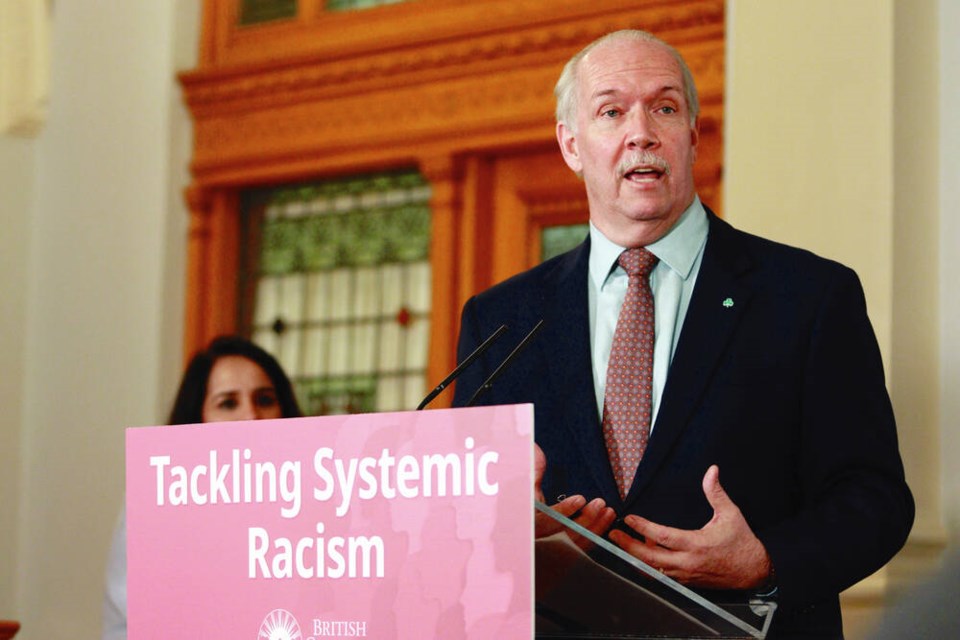The B.C. government is going to start asking more probing questions about citizens’ personal identities in order to compile data about systemic racism, under legislation introduced Monday.
The Anti-Racism Data Act creates a new process for collection and regular public reporting of demographic data that will be used to highlight disparities and inequities in how people of different backgrounds are treated by government. The initial focus will concentrate on the education, correctional service and income assistance spheres.
Some of the data collected could include details on ethnic origin, ancestry, faith, ability and gender identity. An extensive consultation process found most people contacted think compiling that kind of data could build trust between government and Indigenous peoples and other communities of colour. The operating motto is: “We cannot address what we cannot see.”
A provincial census of sorts will start later this year to start compiling data that will identify gaps in programs and services, officials said. Providing information will be voluntary.
The aim is to build a comprehensive race-based data collection system that can be used to shape policies and implement them with confidence, said Premier John Horgan.
He said systemic racism and the long-lasting effects of colonialism have unfairly held people back for too long. “These injustices are compounded when Indigenous peoples and racialized communities ask for action, only to be told by government to provide evidence using data that is not being collected.”
Chief Lydia Hwitsum, of the First Nations Summit, said, Indigenous people have been disproportionately affected by racism in the legal and medical systems and other institutions, “and this injustice has been invisible due to the lack of disaggregated data.”
The bill was introduced by Attorney General David Eby, but he said it was co-developed with Indigenous leadership, one of the first since the government cemented reconciliation in law.
Eby said there is historic mistrust of how government collects and uses information, so the bill sets strict standards on how the data that will be collected is used.
A lot of the groundwork was done by NDP MLA Rachna Singh, parliamentary secretary for anti-racism initiatives. She said: “Our work doesn’t end today — we must face up to the discomfort of talking about racism and fully commit to the work needed to be anti-racist.”
Human rights commissioner Kasari Govender recommended such a bill in 2020, saying the anonymized data can be a powerful tool in righting wrongs.
The bill was introduced just days after a committee of MLAs released a report on policing that identified “increasingly widespread awareness of systemic racism in policing. …”
“Systemic racism, which consists of organizational culture, policies and culture that maintain the power of certain racial groups over others or reinforce the disadvantage of certain racial groups, exists in policing in B.C.”
The report said MLAs heard throughout the consultation about the lack of trust. It called for a significant shift in police culture. It also recommended something similar to the Anti-Racism Data Act, calling on police to report disaggregated race-based and other demographic data and do comprehensive reviews of policies to address systemic racism.
There was a similar report two years earlier involving the health care system. Following stories that some hospital emergency room personnel were playing a guessing game about Indigenous patients’ blood alcohol level, Mary Ellen Turpel-Lafond was appointed to investigate. Although she said there was no evidence of an organized game, there was anecdotal episodic evidence of activities that resembled the allegation.
More broadly she found “disturbing” examples of racism and discrimination. “A picture is presented of a B.C. health care system with widespread systemic racism against Indigenous peoples.
“This racism results in a range of negative impacts, harm and even death.”
There was also a report detailing systemic racism in the Prince George school district last year, relating to how Indigenous students are diverted from the graduation path.
The bill stipulates how data is to be collected and repeatedly stresses it can be used only “for the purposes of identifying and eliminating systemic racism and advancing racial equity.”
The exact standards for use of the data aren’t specified and will be set by regulation later.
A more general anti-racism bill is in the works, to be introduced at a later date.



